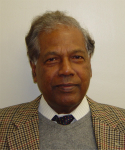| Biography | |
|---|---|
 Dr. A. W. Jayawardena the Department of Civil Engineering of the University of Hong Kong, China |
|
| Title: PARADIGM SHIFT FROM NATURAL INTELLIGENCE TO ARTIFICIAL INTELLIGENCE IN WATER RESOURCES MANAGEMENT | |
| Abstract: Water is essential for all form of life and food comes next. Management of the available water resources for direct consumption and for the production of food therefore goes as far back as one can trace the beginning of civilization. In the ancient times, this has been achieved through conventional wisdom, or natural intelligence, without much technological inputs. Community spirit, cultural values and in some cases religious and political guidance have helped to harness the available water resources for the benefit of not only human beings but also for all living things. Examples include the attempts to harness the waters of River Nile in Egypt, Tigris and Euphrates rivers in Mesopotamia, irrigation canals in India, China, Sri Lanka, Mexico, Grand Canal in China, underground canal systems (qanats) in Mesopotamia and the Roman aqueducts. The demand for water at that time has been mainly for domestic consumption, and for growing food. Due to exponential explosion of population and the changing life styles in the modern world there are additional and sometimes conflicting demands for water. They include power generation, prevention of flooding, recreation, environmental conservation and sometimes for transportation. Managing the available resources which are dwindling in per capita quantity, as well as in quality, which fluctuate with time and space requires a more sophisticated approach. Artificial intelligence (AI) which has found many applications in science, engineering, medicine, and many other fields has the potential to optimize the use of this precious resource. AI can be thought of as an electronic brain. Machine leaning, soft computing, statistical learning, artificial neural networks, fuzzy logic systems, support vector machines, deep learning, data mining etc. can be considered as sub-sets of AI. They all go through the stages of learning, reasoning and perception using external data and generally applicable to data rich theory weak situation. As such they are all data driven. In the context of water resources management, typical problems involve the prediction (or forecasting) of a dependent variable subject to a set of independent variables. In this presentation, the application of artificial neural networks, support vector machines etc. for hydrological predictions will be illustrated. | |
| Biography: A. W. Jayawardena, is currently an Adjunct Professor in the Department of Civil Engineering of the University of Hong Kong where he has been teaching for many years, and a Visiting Professor in the Department of Civil Engineering of Chu Hai College of Higher Education, Hong Kong. In the past he has been a Technical Advisor to the Research and Development Centre of Nippon Koei Co. Ltd, Japan, Research and Training Advisor to the International Centre for Water Hazard and Risk Management (ICHARM) under the auspices of UNESCO, Japan, and concurrently a Professor in the National Graduate Institute for Policy Studies (GRIPS), Japan, and an Honorary Professor in the Department of Statistics and Actuarial Sciences of the University of Hong Kong.
| |
